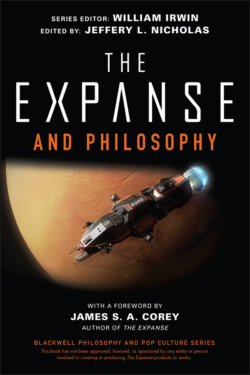Читать книгу The Expanse and Philosophy - Группа авторов - Страница 25
The Value of Humanity
ОглавлениеWe might ask ourselves whether the existence of humankind is valuable in itself. Perhaps surprisingly, some people believe that our extinction would be no great loss.8 We hear echoes of this profoundly pessimistic worldview in Miller’s comment “Stars are better off without us,” after the Nauvoo is repurposed from a generation ship into a missile to drive Eros into the Sun.9
People who hold this pessimistic view seem to think that most human lives are not worth living.
In contrast, Parfit argues that this view might have been plausible in earlier centuries when many people lived lives filled with suffering and with little hope of improvement, but it is certainly wrong today. Notwithstanding the amount of poverty, suffering, and inequality that still exists today, we have come a long way toward reducing human suffering. Consider medical advancements, such as the discovery of anesthetics and painkillers; and consider improvements in living conditions and gains in freedom for all, and not just for a privileged few. It seems likely that in the future we would be able to prevent most human suffering.
Unfortunately, it doesn’t necessarily follow that we will. Many people in The Expanse live miserable and wretched lives. For sick Belters with no access to medicine to forestall the effects of living in low‐gravity, high‐radiation environments, trafficked women and children forced into prostitution on Ceres, and the victims of organized crime and corrupt biotech corporations, life might not be worth living. But all this suffering is not a necessary part of human life. Rather, it is a consequence of poverty, poor living conditions, lack of freedom, inequality, social injustice, and political ineffectiveness. Human life can be wonderful. The existence of human beings is definitely a good thing provided we as a species make every possible effort to ensure that most people live lives worth living, and that we strive to achieve the “wholly just world‐wide community” Parfit talks about. It certainly seems worth trying, rather than throwing our hands in the air and complaining about how terrible human life is.
Philosopher James Lenman points out that, since all species will eventually become extinct, the question is not whether our extinction is a bad thing, but whether it matters how soon that moment comes.10
One way to answer this question is to appeal to the intrinsic value of biodiversity. Suppose it is intrinsically good that many different species exist. This idea is highly plausible and generally accepted. However, the problem is that human beings are not having a particularly good effect on biodiversity; quite the opposite, in fact. We are in the process of causing the Earth’s sixth mass extinction, which is definitely a bad thing. In The Expanse, things are only getting worse, with overpopulation, pollution, and habitat destruction on Earth decreasing biodiversity to pitiful remnants. Even Amos, in Nemesis Games, is somewhat surprised that despite humanity’s pressure on ecosystems, wildlife on Earth still exists. Human beings might still, in the future, go on to have a positive effect on biodiversity overall (more on this below).
To be clear, biodiversity is not just the number of species that exist. It includes functional diversity, an ecological concept that is related to the particular niche an organism occupies in an ecosystem. For example, we could say the rhinoceros occupies a relatively similar ecological niche that the triceratops once occupied. From the perspective of functional biodiversity, the extinction of all flying animals is far worse than the extinction of any particular flying species, because it means the complete loss of this particular way of life. Looking at humans from the perspective of functional biodiversity, no other species has ever occupied the particular ecological niche that humans occupy. Although other species have culture (for example chimpanzees and whales), no other species on Earth has civilization.
In The Expanse vestiges of an ancient alien civilization with incredibly advanced technology have been found—which eventually permits human interstellar expansion through the gates. But in our reality, we have no evidence for the existence of any civilization other than human. Considering the sheer size of the universe and the number of stars and galaxies, though, it is likely that other intelligent life exists somewhere. Nevertheless, we might never find out for sure.11 What we know for sure is that we, Homo sapiens, are, in the words of Parfit, “a part of the Universe that is starting to understand itself.”12 By doing the best we can to guarantee a future for our species, we can also make the universe a better and more meaningful place. We should therefore take the possibility of our extinction seriously indeed.
